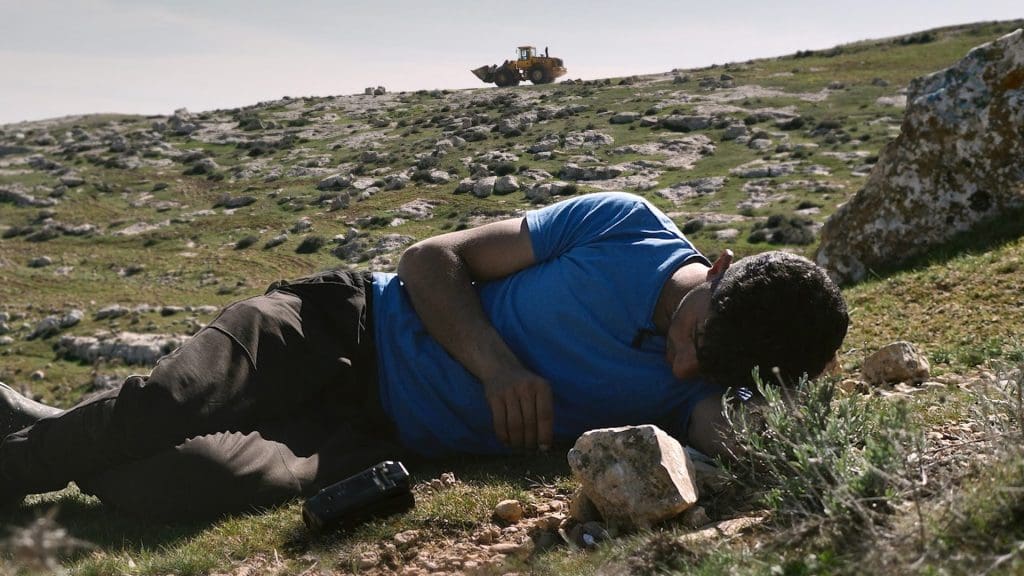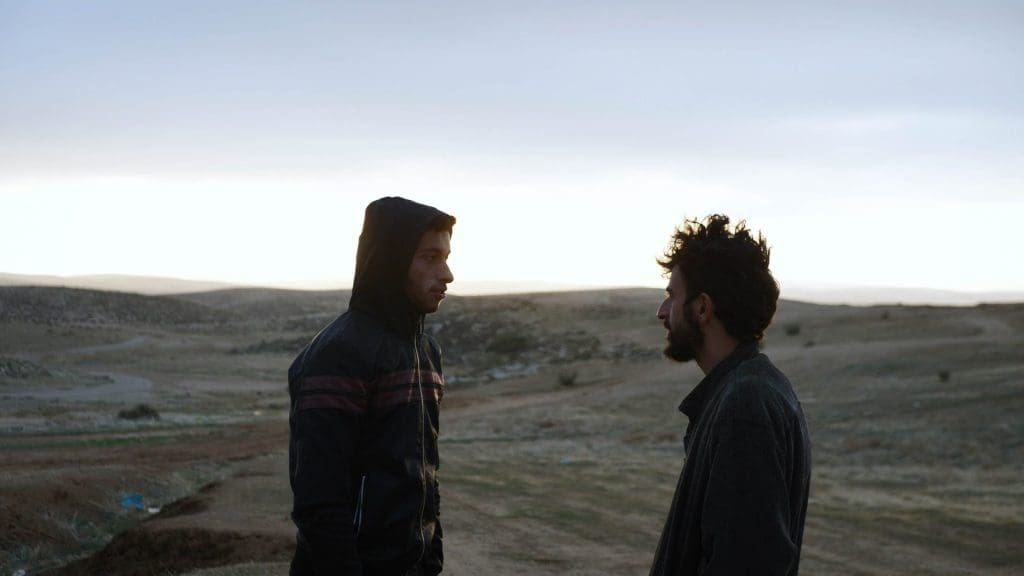
In No Other Land, weapons of destruction and creation coexist. The guns and bulldozers of Israeli soldiers are set against the cameras and phones that document the violence. The documentary emphasises the act of bearing witness as an act of continual resistance and survival—here, the opposite of ‘remember’ is not ‘to forget’, but Israel’s active continual destruction and acts of erasure. As the protagonist’s father emphasises, “It’s impossible to forget. How could we forget our land where we are born.”
Created as a collaboration between Palestinian activist and lawyer Basel Adra, Palestinian photographer and farmer Hamdan Ballal, Israeli activist and journalist Yuval Abraham and cinematographer Rachel Szor, the documentary focuses on the activist community in the West Bank’s Masafar Yatta, an area composed of twenty Palestinian villages. The film takes the activism of Basel and Yuval as its centre, while examining the stark difference between their lives—Basel lives under military occupation, under constant violence and surveillance, whereas Yuval is free to roam and return to Israeli territories after a day of filming.
Beginning in 2019 and filming all the way until December 2023, the documentary bears witness to the long-running violence against Masafar Yatta by both the Israeli army and settlers in what is described in the film’s press notes as “the largest single act of forced transfer ever carried out in the occupied West Bank.”
You might also like: Berlinale 2024: Janet Planet review – a down-to-earth portrait of motherhood
At the beginning of the film, Basel says, “I started to film when we started to end.” His line echoes against the grainy footage of his home videos featuring a 5-year-old Basel herd sheep, a clip of Basel’s father confronting an Israeli soldier decades ago,fragmented among family portraits. The home video bears witness to the past that the Israeli army attempts to deny and erase.
The film records the weekly arrivals of Israeli bulldozers which ram their way into Palestinian homes, toppling them into rubble. Basel does not only observe and record, but actively confronts the soldiers, shouting “I am filming you doing this,”’ defiantly shoving his camera against their rifles. These images hold a vital urgency, of terrifying, shaking moments as he escapes soldiers to avoid being assaulted and arrested. Frequently, the film cuts away from the bulldozer to the eyes of a child witnessing in horror as their home is destroyed, or a mother shouting, “Do you feel no shame?”

Against this continual erasure, we observe the active intransigence of the community who work to rebuild every home that’s toppled. A video of men at night, building by torch-light: Basel records Yuval laying down bricks of a new home and teases him, “At this rate, we will never finish.” The film recounts the work of Basel’s parents, staunch activists who helped build the first school in Masafer Yatta. When the Israeli army raided the village, threatening to arrest them if they continued, Basel’s mother came up with a new tactic. Throughout the day, women and children worked to construct the buildings, while at night, when the army was away, men would continue.
Yet, the grim cycle of demolitions continues, growing more frequent and intense over the years. A man says in despair, “I can’t spend my whole life just trying to build a home,” while another man tells Yuval resentfully: “You destroy our homes while we build homes for you,” referring to the fact that most of the jobs available to Palestinians in the West Bank are low-wage construction gigs in Israeli territories.
The film is notable in its refusal to shy away from the tensions between Yuval, an Israeli, and the Palestinian community. When Yuval first starts writing about Masafer Yatta, Basel scoffs, “You’re too enthusiastic. As if you want to end occupation in ten days.” When Yuval leaves the village, Basel is unable to hide his resentment at Yuval’s ability to travel freely; in turn, Yuval can’t hide his guilt at his freedom at the expense of others. These moments emerge in the same breath as their shared camaraderie and vulnerability.

The film culminates in revealing the violent attacks by settlers after October 7th: armed, shooting Basel’s cousin point blank when he tries to guard his land. Many people have been forced to flee their homes in Masafer Yatta and the future of the village is uncertain. About 301 Palestinians have been killed by Israeli forces and settlers in the West Bank since October 7th, with 3,100 others injured, according to the Palestinian Health Ministry. According to Peace Now, in 2023, settlers established at least 26 new illegal outposts and their research also highlights the alarming trend of forced displacement, saying that “approximately 1,345 Palestinians were forced to flee from their homes due to violent attacks by settlers.” Anadolou Ajansi’s report indicates that about 700,000 Israeli settlers live in roughly 300 illegal settlements in the occupied West Bank and East Jerusalem.
At the Q+A following the film, Basel and Yuvall speak about the surging violence in the West Bank, of settlers who act with complete impunity with no law that protects Palestinians. Basel asks the audience to bear witness and to pressure Western organisations and governments to act. In one particularly striking moment, when the community at Masafar Yatta have finished building the school, their act of resistance gained international attention. Tony Blair, then the Prime Minister of the UK, came and walked around the school and the area for a few minutes. After his visit, Israel paused the demolition plans in the area. “This is a story about power,” says Basel. I think of this ‘power’ as the US and UK continue to provide billions in military aid to Israel and refuse to call for a ceasefire.
The camera in No Other Land is a witness to the martyrs. In Arabic the word for the verb to witness can also be translated as martyr. The film implores us to bear witness and to position ourselves in resistance. If Masafar Yatta can rebuild every home that gets demolished in the face of continual violence, we must be steadfast in our resistance to Apartheid, genocide and Western imperialism. We owe Palestine our endurance and our resilience.





